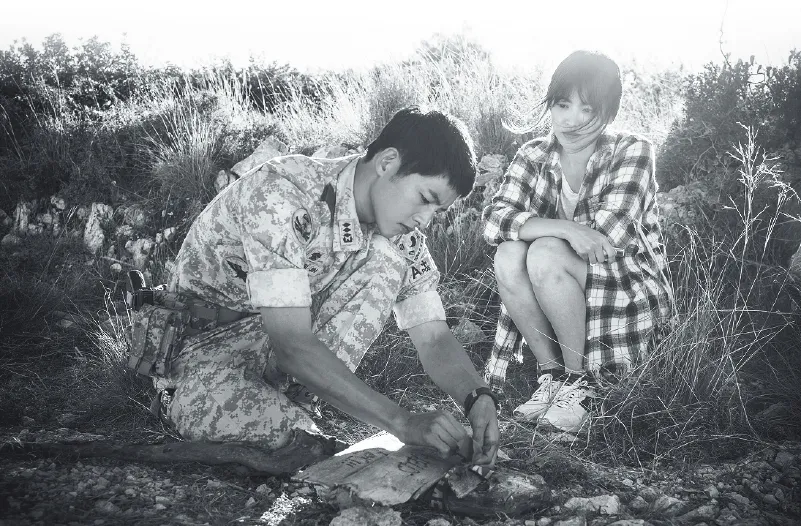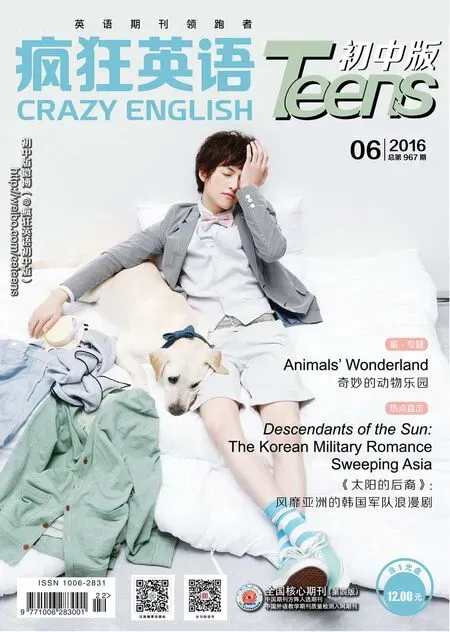《太阳的后裔》:风靡亚洲的韩国军队浪漫剧
by Tessa Wong
翻译:法比仔
《太阳的后裔》:风靡亚洲的韩国军队浪漫剧
by Tessa Wong
翻译:法比仔

要问今年上半年的大热剧是啥?不用说,必定当属那主演颜值爆表、画面唯美的韩剧《太阳的后裔》(Descendants of the Sun)呀!自二月底该剧开播以来,男主角柳时镇的扮演者宋仲基顿时红透了半边天。这个关于特种部队海外派兵队队长柳时镇和外科医生姜暮烟(宋慧乔饰)在韩国和派兵地区之间往返相爱的故事牵动着许多剧迷的心。



Korean television dramas have always been popular across Asia, but the region may have hit the highest Korean drama1)fever with2)military3)romance Descendants of the Sun.
◆ Love Is a Battlefield
The 16-episode show began airing on South Korean television in February. It is also being4)simulcast online in China and shown up on other websites.
It has all the familiar5)ingredients of a Korean drama: a6)complicated plot, the best actors and a foreign location—in this case standing in as the7)fictional8)war-torn9)Mediterranean country Uruk.
But one unique10)feature of Descendants of the Sun is its military setting. It is often not fate that11)gets in the way of the main characters’ happiness, but the urgencies of war.
The show is mostly set in Uruk where a12)special forces13)captain played by Song Joong-ki14)woos an15)army surgeon played by Song Hye-kyo. Rather inconveniently, he often has to leave her at important moments to save lives or go on some other mysterious missions.
An16)editorial carried by People’s Daily praised it as “an excellent advertisement for17)conscription” because it shows South Korea’s “national spirit” and “18)communitarian culture,”and suggested China creates a similar soap opera.
1) fever ['fiːvə】 n. 狂热,兴奋
2) military ['mIlItərI】 adj. 军人的,战争的
3) romance [rəu'mæns】 n. 爱情故事
4) simulcast ['sIməlkɑːst】 v.(广播和电视)同时联播
5) ingredient [In'griːdIənt】 n. 成分,要素
6) complicated ['kɒmplIkeItId】 adj. 错综的,复杂的
7) fictional ['fIkʃənl】 adj. 虚构的
8) war-torn 遭受战争破坏的
9) Mediterranean [medItə'reInIən】 adj. 地中海的
10) feature ['fiːtʃə】 n. 特征,特色
11) get in the way 妨碍,阻碍
12) special force 特种部队
13) captain ['kæptIn】 n. 队长,军官
14) woo [wuː】 v.(男人)求爱
15) army surgeon 战地医生
16) editorial [edI'tɔːrIəl】 n. 社论
17) conscription [kən'skrIpʃən】 n. 征兵(制度)
18) communitarian [kə,mjuːnI'teərIən】 adj. 公有社会的


19) viewership ['vjuːəʃIp】 n. 电视观众,收视
20) boost [buːst】 v. 增进,改善
21) investor [In'vestə】 n. 投资者
22) promote [prə'məut】 v. 促进,发扬
23) patriotism ['pætrIətIzəm】 n. 爱国主义
24) dutiful ['djuːtIful】 adj. 忠实的,顺从的
25) marital ['mærItəl】 adj. 婚姻的
26) criminal ['krImInəl】 adj. 犯罪的,刑事的
27) tabloid ['tæblɔId】 n. 小报
28) obsession [əb'seʃən】 n. 迷恋,痴迷
obsessive [əb'sesIv】 adj. 着迷的
29) drunkenly ['drʌŋkənlI】 adv. 醉醺醺地
30) chase [tʃeIs】 v. 追赶
31) dramatic [drə'mætIk】 adj. 戏剧性的
32) slap [slæp】 v. 掴,拍
33) justify ['dʒʌstIfaI】
v. 证明……是正当的,替……辩护
At home, the drama has broken19)viewership records and won applause from even President Park Geun-hye, who said it could help spread South Korean culture and20)boost tourism.
However, its main fan base lies overseas, particularly China. China has strict rules on broadcasting foreign dramas, but relaxed them for Descendants of the Sun,whose production was reportedly partly funded by Chinese21)investors.
Even Thailand’s Prime Minister Prayuth Chan-ocha—an army general—is a fan of the soap opera. He urged his countrymen to watch it as it22)promotes “23)patriotism,sacrifice, obeying orders and being a24)dutiful citizen.”
The show has been sold to 27 countries including the UK and translated into 32 different languages, according to South Korea’s Yonhap News Agency.
But fandom has its costs. Chinese authorities have warned of the dangers of watching Korean dramas, which it said could lead to25)marital trouble and26)criminal behavior.
Recently, Chinese27)tabloids carried a story of a young man who was so jealous of his wife’s28)obsession with Song Joong-ki that one night he29)drunkenly run into a photography studio and demanded that the shop owner take pictures to “make him look like Song.” The owner eventually called the police.
“When you30)chase male or female stars, do not become too obsessive with them. Because sometimes your casual words could end up hurting those who really care for you,” it said.
It also warned citizens against imitating the more31)dramatic aspects of Korean dramas, such as32)slapping one another during the conflicts.
“Some behavior may seem romantic, but this kind of romance is not acceptable to everyone...it becomes wrong when you33)justify criminal behavior as romance,” it said.
◆ What Fans Are Saying
“The military theme does not appear frequently in TV shows so combined with the romantic theme, this is not like other Korean soap operas.”
“Unlike most Korean dramas which are about a rich guy who falls in love with a poor, golden-hearted girl, the story feels more like the love story of two evenly-matched adults.”

参考译文
韩国电视剧在亚洲一直很受欢迎,而军队主题浪漫剧《太阳的后裔》更是掀起了最高的韩剧热潮。
◇爱如战场
这部共16集的电视剧于2月在韩国电视上开播。其也在中国的网站以及其他国家的网站上同步播出。
这部剧集合了韩剧所有常见的元素:复杂的情节、一流的演员,还有海外取景地—而它的背景便设在一个虚构的饱受战争蹂躏的地中海国家乌鲁克。
但《太阳的后裔》与众不同的地方在于它的军队故事背景。在那样的背景下,往往不是命运,而是那万分紧迫的战争,阻碍了主人公们的幸福。
该剧将故事地点主要设定在乌鲁克。在那里,由宋仲基扮演的特种部队队长追求着由宋慧乔扮演的战地医生。让这对情侣十分苦恼的是,他常常不得不在重要时刻离开她,去拯救他人的生命或是去执行其他的一些秘密任务。
《人民日报》的一篇社论称赞这部剧是“杰出的征兵广告”,因为它展示了韩国的“民族精神”和“共产主义文化”。社论里还建议中国拍摄类似的肥皂剧。
在韩国,这部剧已经打破了收视纪录,甚至还赢得了总统朴槿惠的赞赏。她说这部韩剧可以帮助传播韩国文化及推动旅游事业。
然而,这部韩剧的主要观众群在海外,尤其是在中国。中国对于播放外国电视剧一向有着严格的规定,而《太阳的后裔》之所以能够引进中国,是因为据报道称该剧有一部分是由中国投资者来投资的。
甚至连泰国总理兼陆军总司令巴育·占奥差也是这部肥皂剧的粉丝。他敦促他的国民们去看看这部剧,因为它宣扬了“爱国主义、牺牲、服从命令,以及做一个尽职的公民”。
据韩国的联合通讯社报道,这部韩剧已经被包括英国在内的27个国家引进,翻译成了32种不同的语言。
但狂热追捧的背后是有代价的。中国有关部门已经警告了人们看韩剧的危害,有些危害可能会引发婚姻问题与犯罪行为。
近来,中国的小报报道了一则新闻。一名年轻男子由于过分嫉妒他的妻子对于宋仲基的痴迷,在一天晚上醉醺醺地跑进了一个照相馆,要求老板把他拍得“像宋仲基一样”。老板最终报了警。
新闻里还评论说:“当你在追逐男明星或女明星时,不要过于沉迷其中。因为有时你随口的话语最终可能会伤害那些真正关心你的人。”
评论还告诫市民不要模仿韩剧里较为夸张的情节,比如在冲突中赏别人一个耳光。
“有些行为似乎是浪漫的,但并非每个人都可以接受这种浪漫……如果你认为犯罪行为是一种浪漫,就大错特错了,”该新闻评论道。
◇粉丝们的一些话
“军队主题结合浪漫主题的电视剧并不常常出现在电视上,它区别于韩国的其他肥皂剧。”
“大多数的韩剧都是关于一个富有的男孩爱上了一个贫穷却心地善良的女孩,与之不同,《太阳的后裔》感觉更像是两个门当户对的成年人间的爱情故事。”
Descendants of the Sun:The Korean Military Romance Sweeping Asia

